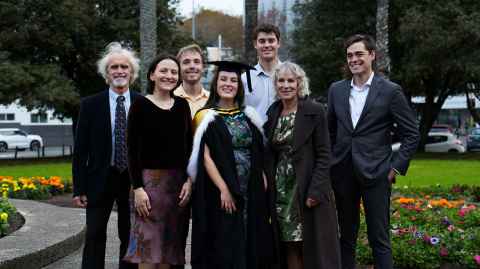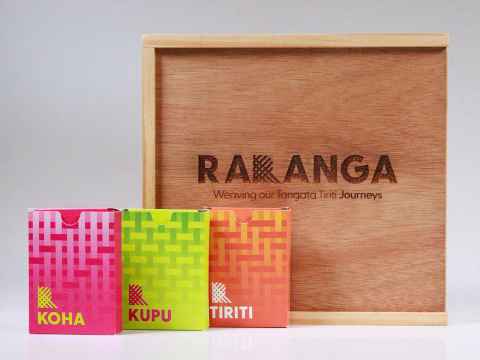Raranga: weaving identity through design
14 May 2025
Leah Kampkes has created an accessible game that helps inform Tangata Tiriti on Māori culture, the Treaty of Waitangi, and pressing issues – in an informed way.

Leah Kampke (Ngāti Manu, Ngāpuhi) grew up on the North Shore of Auckland and had a knack for creativity from an early age.
A lover of painting, fashion, makeup, and nails, she naturally gravitated toward creative expression – something that would later shape her academic and kaupapa Māori contributions.
Now a graduate of Waipapa Taumata Rau, University of Auckland, Leah holds a conjoint bachelors in Design and Global Studies, majoring in Human Rights and Global Politics, with a regional focus on Māori in Aotearoa.
“I actually didn’t go into uni thinking I would study anything Māori, but I picked all the Māori papers because I was drawn to them. It’s been cool to see how everything has led me back to my culture.”
During her undergraduate years, Leah discovered the power of theory when grounded in practice. Global Studies gave her a broad understanding of historical and socio-political contexts, while Design provided a medium to bring that knowledge to life in a practical way.
“Having that theoretical background helped me to build up context and understanding, and then my Design courses were the creative output of all of that learning.”
Leah’s commitment to social justice and community was apparent even in high school. She led a feminism club and was deeply engaged in equity-based initiatives such as a peer service drive to collect winter essentials for tamariki in Te Tai Tokerau.
She recalls attending a university open day in Year 12 (just before the Covid-19 lockdowns struck in Year 13) and feeling inspired by the newly launched Global Studies and Design programmes.
“I loved my experience at the Open Day. It was the first year they introduced Global Studies and Design as new degrees, and I got to go to those lectures with the heads of department. It was really cool to see what I could do.”
That spark later evolved into a project that braided her passions into a kaupapa Māori initiative – Raranga, a card-based educational game designed during her final year.

The project originated from Leah’s involvement as a research assistant in a design department initiative that investigated how the programme could better support its small cohort of Māori students.
“I created a card game that teaches people about Te Tiriti and the importance of their role as Tangata Tiriti (non-Māori),” she says.
“There’s a kupu Māori round and a Tiriti round, and you earn harakeke tokens that you use to weave a takirua (or double strand). You start the game with karakia and your pepeha, and you end with a koha card, which is an action to take away – like learning a karakia or doing something at your workplace.”
Players work in teams, weaving together their learning as the game progresses. The first team to complete a raranga strand wins, emphasising collaboration and shared accountability rather than individual competition.
The structure of the game reflects Māori values of collective action, connection, and reciprocity, with each round prompting reflection, learning, and real-world application. From kupu Māori flashcards to Te Tiriti-based scenarios, Raranga challenges players to move beyond passive learning and into meaningful cultural engagement.
Leah was inspired to create the game after noticing how frequently cultural responsibilities fall on Māori staff and students in learning and professional spaces.
“I’ve seen how much pressure and expectation there is for kaimahi Māori to do all the cultural labour."
A classic example she says, is the karakia.
“It’s too much. So, I wanted to make something that puts that responsibility back on others and gives them the tools to participate.”
The name Raranga held both symbolic and personal significance for Leah. At the time she was developing the game, her mother had just started learning raranga herself.
“My mum was learning raranga at the same time, and she would come home and tell me all these beautiful kōrero and insights from her classes. I realised how powerful raranga is for healing and reconnection.”
Raised in a whānau disconnected from its roots, Leah is among the first in her family to actively reclaim and revitalise their Māori identity.
“It’s easier for me than it was for my mum. I’ve been able to access education and safe spaces that let me feel confident in who I am. And now I want to create those spaces for other people – to help them feel proud, safe, and seen.”
Through Raranga, Leah has woven her passions for design, justice, and te ao Māori into a purposeful contribution. As she looks ahead, she hopes to continue deepening her knowledge and impact in kaupapa Māori spaces.
“I want to keep learning and growing in Māori spaces – that’s where I’m going.”
Media contact
Te Rina Triponel | Kaitohutohu Pāpāho Māori
E: te.rina.triponel@auckland.ac.nz